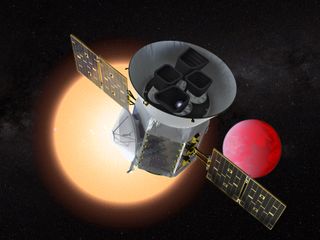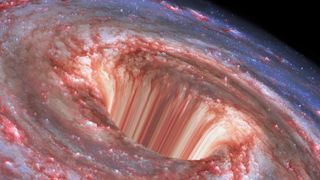
Paul Sutter
Paul M. Sutter is a research professor in astrophysics at SUNY Stony Brook University and the Flatiron Institute in New York City. He regularly appears on TV and podcasts, including "Ask a Spaceman." He is the author of two books, "Your Place in the Universe" and "How to Die in Space," and is a regular contributor to Space.com, Live Science, and more. Paul received his PhD in Physics from the University of Illinois at Urbana-Champaign in 2011, and spent three years at the Paris Institute of Astrophysics, followed by a research fellowship in Trieste, Italy.
Latest articles by Paul Sutter
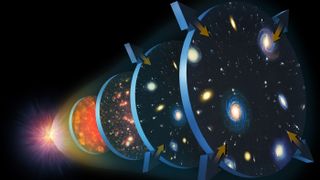
Will we ever know exactly how the universe ballooned into existence?
By Paul Sutter published
Physicists have long been unable to describe what happened just after the Big Bang when a teensy blip ballooned into the universe, a process called inflation. We may know why.
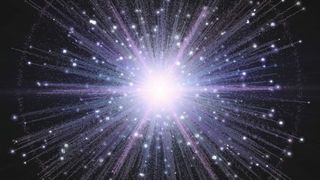
The 1st few seconds of the Big Bang: What we know and what we don't
By Paul Sutter published
Opinion Believe it or not, physicists are attempting to understand the universe when it was only a handful of seconds old.
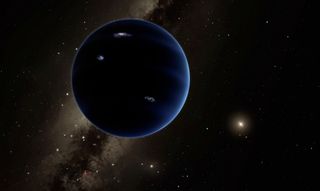
What if Planet Nine is a baby black hole?
By Paul Sutter published
The hypothetical Planet Nine may not be a planet but rather a small black hole that might be detectable from the theoretical radiation emitted from its edge, so-called Hawking radiation.
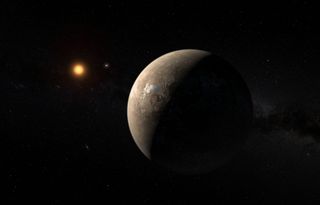
Can super-rotating oceans cool off extreme exoplanets?
By Paul Sutter published
New research suggests a way to move heat around "tidally locked" alien planets: ocean currents whipping around the worlds faster than they rotate.
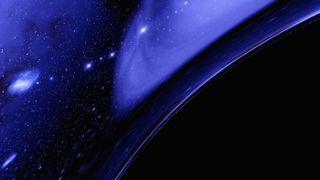
Black holes could be dark stars with 'Planck hearts'
By Paul Sutter published
Black holes may not be black or holes, a new theory proposes.
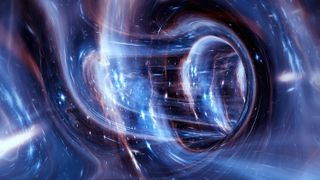
'Gravity portals' could morph dark matter into ordinary matter, astrophysicists propose
By Paul Sutter published
Astrophysicists have a wild idea to explain the bizarre abundance of super-high-energy radiation shooting from the center of our galaxy: gravity portals.

Could there be a cluster of antimatter stars orbiting our galaxy?
By Paul Sutter published
We don't know why the universe is dominated by matter over antimatter, but there could be entire stars, and maybe even galaxies, in the universe made of antimatter.
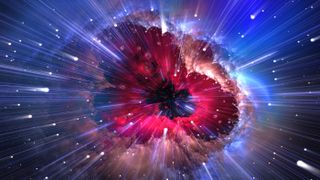
Superpowerful 'oscillon' particles could have dominated the infant universe, then vanished
By Paul Sutter published
A weird, super-powerful particle that's not truly a particle could have dominated the universe when it was just a second old, releasing a flood of ripples that permeated all of space-time.
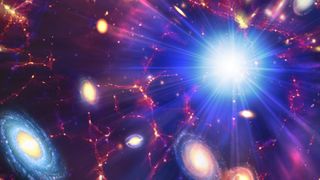
Mysterious 'kick' just after the Big Bang may have created dark matter
By Paul Sutter published
A mysterious "kick" in the early universe may have produced more matter than antimatter. And that imbalance may have also led to the creation of dark matter, researchers now say.
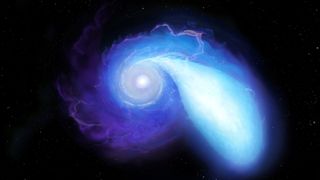
Neutrons' 'evil twins' may be crushing stars into black holes
By Paul Sutter published
The universe may be filled with "mirror" particles — and these otherwise-undetectable particles could be shrinking the densest stars in the universe, turning them into black holes.
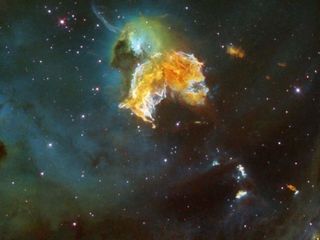
How do stars die?
By Paul Sutter published
Surprisingly, the fate of a star is easy to predict. All you need to know is how big it is.
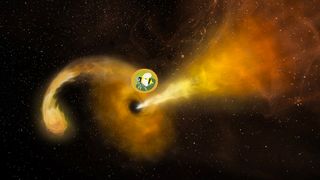
'Bumblebee gravity' could explain why the universe is expanding so quickly
By Paul Sutter published
Bumblebee gravity could explain dark energy — if it's proven true.
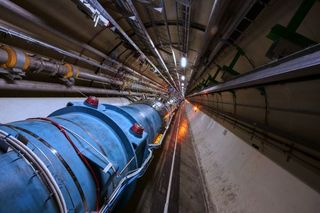
Where are all the squarks and gluinos?
By Paul Sutter published
There have been no signs of supersymmetry, and the theory is looking a little shaky, researchers say.
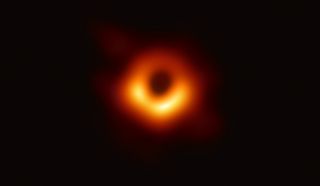
Are primordial black holes really giant gravitinos?
By Paul Sutter published
New research proposes that the first black holes came from clumps of gravitinos, exotic, hypothetical particles that managed to survive the first chaotic years of the Big Bang.
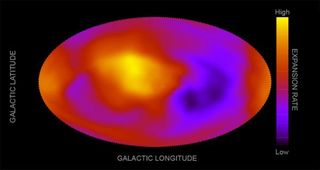
Is there more than one dark energy?
By Paul Sutter published
What if there is more than one cosmological agent for dark energy? This mixture would have strange effects in our universe, making it potentially detectable with upcoming surveys.
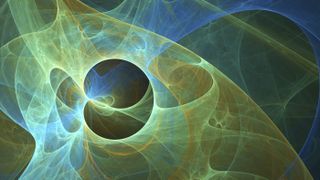
Physicists attempt to unify all forces of nature and rectify Einstein's biggest failure
By Paul Sutter published
Einstein's failed dream could ultimately become his ultimate triumph, as a small group of theoretical physicists rework his old ideas to explain the most pressing issues of modern science.
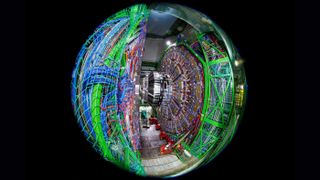
World's largest atom smasher could seed microscopic black holes
By Paul Sutter published
If teensy black holes could be produced inside the world's largest atom smasher, the Large Hadron Collider, that would be a boon for physics.
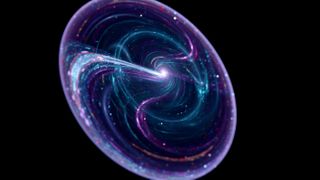
Black holes may not exist, but fuzzballs might, wild theory suggests
By Paul Sutter published
What if black holes aren't black holes at all, but rather the cosmic equivalent of fuzzy, vibrating balls of string?
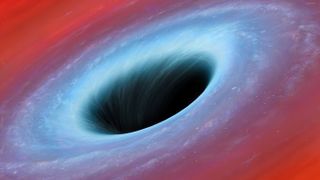
Dangerous 'naked' black holes could be hiding in the universe
By Paul Sutter published
Black holes shorn of event horizons could lurk throughout the universe.
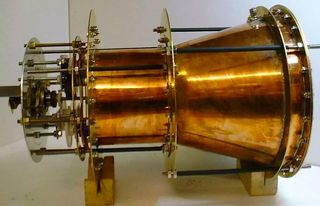
Can the EmDrive actually work for space travel?
By Paul Sutter published
The EmDrive doesn't just violate our fundamental understanding of the universe; the experiments that claim to measure an effect haven't been replicated. When it comes to the EmDrive, keep dreaming.
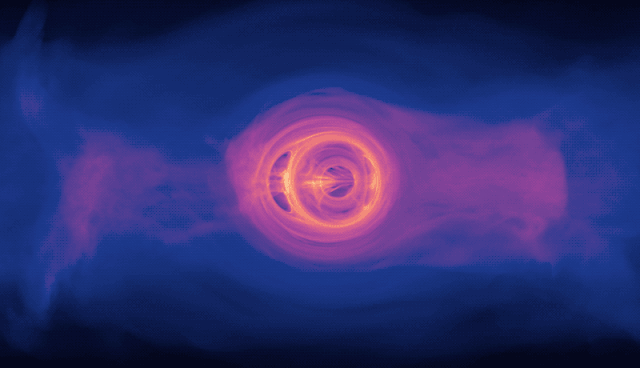
Weird 'gravitational molecules' could orbit black holes like electrons swirling around atoms
By Paul Sutter published
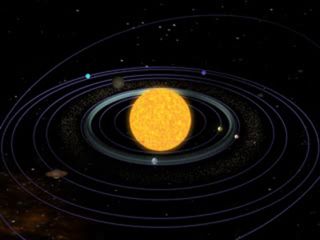
Will our solar system survive the death of our sun?
By Paul Sutter published
Our sun's death is a long way off — about 4.5 billion years, give or take — but someday it's going to happen, and what then for our solar system?

What happens at the center of a black hole?
By Paul Sutter published
At the center of a black hole, matter is compressed down to an infinitely tiny point, and all conceptions of time and space completely break down.
Get the world’s most fascinating discoveries delivered straight to your inbox.
